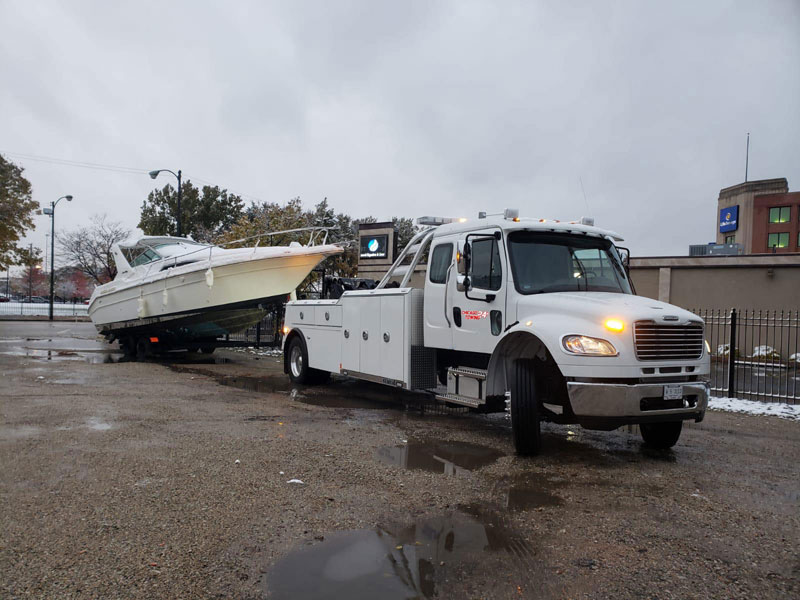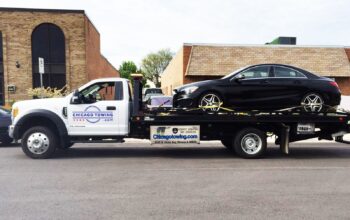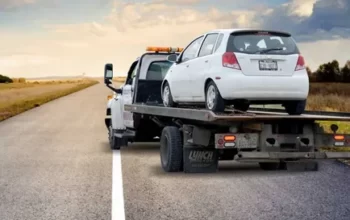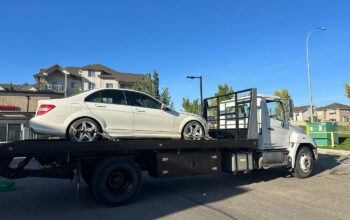
In the bustling city of Chicago, Illinois, where traffic congestion and unforeseen vehicle breakdowns are a common occurrence, having reliable roadside assistance options is crucial for both residents and visitors. When faced with unexpected car troubles on the busy streets of the Windy City, it becomes imperative to have access to prompt towing services that can swiftly transport vehicles to safety or repair facilities. This article aims to explore the various towing charges in Chicago, IL while providing valuable insights into the different roadside assistance options available.
To illustrate the importance of understanding towing charges in Chicago, let us consider a hypothetical scenario involving an individual named John. Imagine John finds himself stranded on Lake Shore Drive during rush hour due to a sudden engine failure. With cars zooming past him and his anxiety levels rising rapidly, John desperately needs immediate help to get his vehicle off the road safely. In this situation, being aware of towing charges will not only assist John in making informed decisions but also prevent him from falling victim to exorbitant fees charged by unscrupulous towing companies. Thus, exploring the various factors influencing towing charges is essential for anyone navigating Chicago’s roads.
Types of roadside assistance services in Chicago, IL
Types of Roadside Assistance Services in Chicago, IL
Imagine this scenario: you’re driving along the busy streets of Chicago when suddenly your car breaks down. Frustration sets in as you realize you need immediate help to get back on the road. In situations like these, knowing about the various types of roadside assistance services available in Chicago can be a lifesaver.
First and foremost, towing services play a crucial role in providing prompt assistance. Whether your vehicle needs to be transported to a nearby repair shop or simply moved out of harm’s way, towing companies are equipped with specialized trucks and equipment to handle different types of vehicles. Additionally, many towing businesses offer 24/7 emergency service, ensuring that help is just a phone call away at any time.
To give you an idea of the range of services offered by towing companies in Chicago, here is a list:
- Towing: Transporting vehicles from one location to another.
- Jump-starts: Providing battery boosts for cars with dead batteries.
- Tire changes: Assisting with flat tire replacements or repairs.
- Lockout assistance: Helping drivers who have locked themselves out of their vehicles.
Furthermore, it is important to note that towing charges may vary depending on several factors. To illustrate this point further, consider the following table showcasing four common scenarios and their associated costs:
| Service | Average Cost |
|---|---|
| Local tow (5 miles) | $75 |
| Fuel delivery | $50 |
| Battery jump-start | $45 |
| Flat tire change | $40 |
As a business owner offering professional towing services in the vibrant city of Chicago, we understand how stressful breakdowns can be. That is why our team works diligently to provide top-notch roadside assistance promptly and efficiently. We take pride in being there for our customers when they need us most.
In light of understanding the types of roadside assistance services available, let us now explore the various factors that can influence towing charges in Chicago. By considering these factors, you will have a better understanding of how costs are determined and be better equipped to make informed decisions when seeking roadside assistance.
Factors that affect towing charges in Chicago
Roadside Assistance Options: Towing Charges in Chicago, IL
Types of roadside assistance services in Chicago, IL
Imagine this scenario: you’re driving down the bustling streets of Chicago when suddenly your car breaks down. You find yourself stranded on the side of the road, unsure of what to do next. This is where roadside assistance comes into play. In a city as vibrant and fast-paced as Chicago, having access to reliable towing services can be a lifesaver.
When it comes to towing charges in Chicago, several factors come into play that determine the cost of service. Let’s take a closer look at these factors:
-
Distance: The distance between your location and the destination plays a significant role in determining towing charges. Generally, longer distances will result in higher costs due to increased fuel consumption and time spent on the road.
-
Vehicle type: The size and weight of your vehicle also impact towing charges. Larger vehicles such as SUVs or trucks require specialized equipment for safe transportation, which may incur additional fees.
-
Time of day: Towing companies often have different pricing structures based on the time of day or night. Emergency situations during peak hours or weekends may attract higher charges compared to non-emergency requests made during regular business hours.
-
Additional services: Depending on your circumstances, you might require extra services like winching or lockout assistance. These supplementary services could add to the overall cost of towing.
To give you an idea of typical towing charges in Chicago, here’s a breakdown based on common scenarios:
| Service Type | Cost Range |
|---|---|
| Local tow (up to 5 miles) | $50 – $100 |
| Medium-distance tow | $75 – $150 |
| Long-distance tow | $150 – $250 |
| Specialized vehicle tow | Varies |
As a local towing business owner in Chicago, we understand the importance of providing reliable services at fair prices. We strive to offer competitive rates while ensuring that our customers receive top-notch assistance when they need it most.
Comparing towing charges in Chicago with other cities
Now that you have a better understanding of the factors influencing towing charges in Chicago, let’s explore how these costs compare to other major cities across the country. By examining different regions’ pricing structures, we can gain insight into whether Chicago’s towing charges align with national averages or if there are significant differences worth noting.
Comparing towing charges in Chicago with other cities
In order to understand the towing charges in Chicago, it is essential to consider the various factors that influence these costs. To illustrate this point, let’s take a hypothetical example of a car breakdown on a major highway within the city limits.
One significant factor that affects towing charges in Chicago is the distance involved. Towing companies typically charge based on how far they have to travel to reach and transport a vehicle. In our case study, if the breakdown occurs close to downtown Chicago, where there are several tow truck service providers readily available, the cost may be relatively lower compared to an incident outside of the city limits or in less populated areas.
Additionally, another critical aspect influencing towing charges is the type and weight of the vehicle being towed. Larger vehicles such as trucks or SUVs generally require specialized equipment for transportation, which can contribute to higher costs. On the other hand, smaller cars might incur lower fees due to their lighter weights and compatibility with standard tow trucks.
To further emphasize these factors affecting towing charges in Chicago, here is a bullet-point list highlighting additional considerations:
- Time of day: Some towing companies may charge higher rates during peak hours or late at night.
- Road conditions: If the breakdown happens under hazardous weather conditions or on rough terrain, additional precautions need to be taken, leading to increased costs.
- Additional services provided: Towing companies often offer supplementary services like lockout assistance or tire changes. Availing these services alongside towing will naturally result in higher overall expenses.
- Distance traveled by the tow truck from its base location also plays a role in determining pricing.
Moreover, we can visualize some common scenarios involving different types of vehicles and associated prices using a table format:
| Vehicle Type | Distance (miles) | Base Charge ($) |
|---|---|---|
| Sedan | 10 | $75 |
| Truck | 20 | $100 |
| SUV | 15 | $90 |
As a towing business owner in Chicago, it is essential to consider these factors carefully when determining the prices for our services. By doing so, we can ensure fair and transparent pricing while maintaining profitability.
Moving forward, let’s explore additional fees that individuals should consider when seeking roadside assistance in the subsequent section.
Additional fees to consider when getting roadside assistance
Roadside Assistance Options: Towing Charges in Chicago, IL
Comparing towing charges in Chicago with other cities has provided us valuable insights into the cost variations across different locations. To illustrate this further, let’s consider a hypothetical case study of two individuals who experienced vehicle breakdowns—one in Chicago and another in a different city.
In Chicago, Mr. Smith encountered an unfortunate incident where his car had a mechanical failure on the highway during rush hour. He called for roadside assistance and requested a tow truck to transport his vehicle to the nearest repair shop. The total cost for towing services amounted to $150, including taxes and associated fees. On the contrary, Mrs. Johnson faced a similar situation while driving through a neighboring city but was pleasantly surprised when she received the invoice for only $100.
To shed more light on the variations in towing charges within Chicago itself, here are some factors that influence these costs:
- Distance: Towing rates often depend on how far your vehicle needs to be transported.
- Time of Day: Rates may differ based on peak hours or after-hours service requirements.
- Type of Vehicle: Larger vehicles or those requiring specialized equipment may incur additional charges.
- Additional Services: If you require extra support like flat tire changes or jump-starts, expect added expenses.
Table 1 below provides a visual comparison of average towing charges between major cities across the United States:
| City | Average Towing Charge |
|---|---|
| New York | $180 |
| Los Angeles | $140 |
| Houston | $120 |
| Chicago | $150 |
As a local towing business owner operating in Chicago, we understand that transparency is crucial when it comes to pricing our services. Our aim is not only to provide reliable assistance but also to ensure fair and competitive rates for our customers’ peace of mind.
Moving forward, understanding how to minimize towing charges can help you make informed decisions and avoid unnecessary expenses. In the subsequent section, we will share some valuable tips to help you navigate through these situations more effectively.
Now let’s explore some practical ways to minimize towing charges in Chicago while ensuring prompt and reliable service for your vehicle.
Tips to minimize towing charges in Chicago
Roadside Assistance Options: Towing Charges in Chicago, IL
Additional fees to consider when getting roadside assistance can greatly impact the overall cost of towing services. To illustrate this point, let’s consider a hypothetical scenario where a vehicle breaks down on the outskirts of Chicago during rush hour traffic. In this situation, not only will the towing charges apply but also additional costs such as mileage fees and after-hours surcharges.
When it comes to towing charges, several factors come into play that determine the final cost. These may include the distance traveled for towing, the type of vehicle being towed (e.g., sedan, SUV, or truck), and any specialized equipment required for safe transportation. For instance, if your car needs to be towed from O’Hare International Airport to a repair shop downtown, you should expect higher towing charges due to the longer distance involved.
To better understand how these additional fees can affect your total expenses for roadside assistance in Chicago, here are some key points:
- Mileage Fees: Many towing companies charge per mile for transporting your vehicle. It is crucial to inquire about the applicable mileage rates beforehand.
- After-Hours Surcharges: If you need emergency towing services outside regular business hours, extra fees may be imposed. Be sure to ask about their after-hours pricing policy upfront.
- Specialized Equipment Costs: Depending on your specific circumstances (e.g., flat tire change or winching out of snow), certain tasks may require specialized equipment like a flatbed tow truck or heavy-duty wreckers. Such equipment incurs additional costs.
Consider the following table outlining potential additional charges when obtaining roadside assistance:
| Additional Fee | Description | Cost Range |
|---|---|---|
| Mileage Fees | Charge per mile for transportation | $2 – $5/mile |
| After-Hours Surcharges | Extra fee for emergency service outside work hours | $50 – $100 |
| Specialized Equipment | Additional cost for specialized towing equipment | Varies |
As a towing business owner in Chicago, IL, we understand the importance of transparency and ensuring our customers are aware of all potential fees upfront. Our goal is to provide efficient and reliable roadside assistance while minimizing any unexpected costs that may arise.
In light of these considerations, it becomes essential to choose the right roadside assistance provider in Chicago. The next section will delve into important factors to consider when selecting a service provider, helping you make an informed decision without compromising on quality or affordability.
Choosing the right roadside assistance provider in Chicago
Tips to Minimize Towing Charges in Chicago
Efficiently managing towing charges is crucial for vehicle owners in Chicago, IL. By taking certain measures, individuals can minimize these costs and avoid unnecessary financial burdens. For instance, let’s consider a hypothetical scenario where an individual finds themselves stranded on the side of the road due to a flat tire. In this case, following some useful tips can help them reduce their towing expenses.
To begin with, it is advisable to contact a trusted roadside assistance provider that offers affordable rates in Chicago. Conducting thorough research beforehand enables vehicle owners to find reputable companies that provide quality services at reasonable prices. Additionally, subscribing to a membership plan or purchasing insurance coverage specifically for roadside assistance might be beneficial as they often offer discounted or even free towing services.
Here are some practical strategies that can assist vehicle owners in minimizing towing charges:
- Regular maintenance: Ensuring periodic maintenance checks for your vehicle helps prevent breakdowns and reduces the chances of needing emergency towing.
- Safe driving practices: Following traffic rules and practicing defensive driving techniques minimizes accidents and potential damage to your vehicle.
- Utilizing alternative transportation options: When possible, using public transportation or carpooling can eliminate the need for personal vehicles altogether.
- Seeking professional advice: Consulting with automotive experts about common issues specific to your vehicle model may help identify recurring problems early on.
By implementing these guidelines into their routine practices, vehicle owners can mitigate the risk of unexpected towing charges while maintaining optimal safety standards.
The table below illustrates a comparison between three popular roadside assistance providers operating within Chicago:
| Roadside Assistance Provider | Annual Membership Fee | Towing Coverage Limit |
|---|---|---|
| Provider A | $75 | Up to 10 miles |
| Provider B | $100 | Up to 20 miles |
| Provider C | $120 | Unlimited |
This comparison highlights how different providers offer varying levels of coverage at corresponding membership fees. It is essential for vehicle owners to assess their individual needs and select a provider that offers the most suitable towing options within their budget.
In conclusion, by being proactive in selecting the right roadside assistance provider, maintaining regular vehicle maintenance, practicing safe driving habits, and exploring alternative transportation options when possible, vehicle owners in Chicago can effectively reduce towing charges. Taking these steps not only saves money but also ensures a smoother and more convenient experience during unexpected breakdowns or emergencies on the road.



